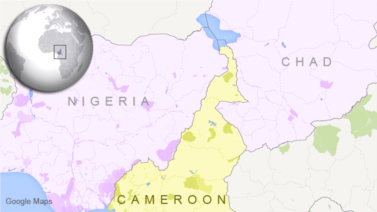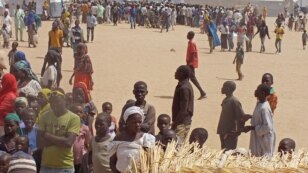The Cameroonian government says that terrorism threatens large numbers of schoolchildren. Two bomb attacks killed nine people last month in the town of Kolofata, near the border with Nigeria.
At the same time, millions of children returned to school after a three-month holiday. Cameroon has been working to make its school campuses safer.
One of the most dangerous areas is along the border with Nigeria.
Many families want to leave the dangerous border areas. Sixteen-year-old Ahmidou Moussa was not able to return to school on time because of the threat of suicide bombings. His school is in the town of Mora, on the border with Nigeria.
He says he was not really worried during the holiday because his parents took him far away from the dangerous border zone to a safer area.
Valentine Tameh is president of the Teachers Association of Cameroon. He says many teachers are refusing to teach in areas along the border with Nigeria. He says he has told teachers to continue to work even in the border area.
"We are appealing to those who have been posted there that that is Cameroon. You have to go there and do your work. But we are also, more loudly, telling government that they have a moral duty to take care of those teachers there."
Ndzi Amos Tarla is a police spokesperson. He has talked with students, teachers and parents about keeping young schoolchildren safe. He says if the population works with officials, terrorists will find it more difficult to carry out attacks.
He warns that children should not trust strangers because they might be kidnappers, and that parents should walk to school with their young children. He also says that children must be taught about how to act around strangers.
“Most of all if they notice anything, they should report it immediately to the security officials they see. They are their friends and not their enemies."
Searches to enter school
Dualla is the economic capital of Cameroon. There, school staff members search students and their bags with metal detectors before they can enter the school. Officials say they are doing all they can to avoid future attacks.
Suzanne Ngumey’s children go to school in Dualla. She says she agrees with the new security measures.
"This is just to protect our children because we want their safety in school," she said. "And we want everybody to be relaxed and happy to be here. With all the heightened threats in town and wherever, we have to make sure that our children are safe.”
Last year, Cameroon closed 70 schools on its northern border with Nigeria's Borno state. More than 100,000 students were relocated to new schools.
I'm Mario Ritter.
Moki Edwin Kindzeka wrote this story for VOA News. Haruka Takeuchi adapted it for VOA Learning English. Ashley Thompson was the editor.
Words in This Story
post – v. chiefly British : to send (someone) to a place to work for a long period of time as part of a job
kidnapper – n. to take away (someone) by force usually in order to keep the person as a prisoner and demand money for returning the person
accompany – v. to go somewhere with (someone) : to be a companion for (someone)
company – n. the state or condition of being with another person
Now it’s your turn. What do you think of the school along the border? Do you have experiences you couldn’t go school because of terrorism? Write to us in the comments section or on our Facebook page.

